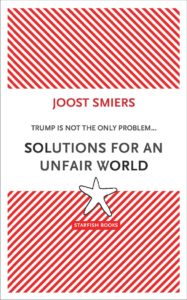Solutions For An Unfair World ~ Curb Globalisation: A Dialogue Between The Veritable Left And The Simplifying Right
No Comments yet When we look at the present global ideological and economic battlefield, two roads are open. The first is continuing on the path of ongoing neoliberal globalisation, deregulation of markets, further privatisation of public services and facilities, and leaving the global economic playing field to transnational companies that regard themselves as global governments rather than as serving the public good.
When we look at the present global ideological and economic battlefield, two roads are open. The first is continuing on the path of ongoing neoliberal globalisation, deregulation of markets, further privatisation of public services and facilities, and leaving the global economic playing field to transnational companies that regard themselves as global governments rather than as serving the public good.
The completely opposite option is breaking with this, recognizing that democracy can never get a grip on what is happening at the global level, and bringing back important decisions for the daily lives of people to the levels which are familiar to them: the national state and the local community in which they live. We have to acknowledge that, under the conditions of unrestrained globalisation, the countries of the European Union and other parts of the world can not provide the protection that people need. From the previous chapters it will be clear that I opt for this last possibility: it is better to consider neoliberalism as an aberration, and to bring corporations as quickly as possible back into society, instead of letting them think they are the masters of the universe.
In order to achieve this radical change, a broad coalition is needed among populations. Looking at the political landscape, for instance in Europe, it can be noted that the conservative and moderate liberal parties show undiminished faith in the economic globalisation and liberalisation that has been started a few decades ago. The painful thing is that important currents in social democracy are not opposed to it as well, be it with efforts to uphold humanitarian and social values, even if in vain.
The forces that want to curb globalisation are on the veritable left of the political spectrum and in the camp of what I call the simplifying right. It would be obvious to encourage these currents to form alliances, but there are too many obstacles on the road. For example, it does not seem likely that the veritable left can mobilize the vast majority of populations; and the right which is critical of globalisation and Europe sometimes errs on the side of xenophobia and exclusion. Even more important is that the simplifying right actually wants to bring political decision-making closer to home, i.e. to the nation-state, but it does not mention transnational companies, which make sure that we live in a world that we can not get to grips with anymore, and heap misery upon us. One can think of their environmental footprint, of the financial risks these companies take, of tax evasion, of the existence of a big gap between the poor and rich, and of various forms of criminal behaviour they are guilty of.
A first task would be to start a discussion with the supporters of the simplifying right about their dissatisfaction with the global and the European order. This is the kind of conversation I have argued for in the previous chapters. It has a strategic goal. First of all, it is not difficult to agree that we must leave the neoliberal globalisation agenda behind us and make the European Union moderate in its pretensions.
But – and here the conversation becomes more difficult – this will produce scant results if the transnational companies are not split up into negotiable segments and if the smaller companies which will emerge out of them will not be faced with a set of social requirements: what do we expect as citizens of companies that provide us with products and services? Such a conversation does not make any sense with entrenched neoliberals from the conservative camp and from the center-left. But such a conversation may be actually prove to be useful with people who don’t want anything from today’s globalisation. This may presuppose a bit of optimism, and some political and social courage, but why not give it a chance?
You May Also Like
Comments
Leave a Reply







